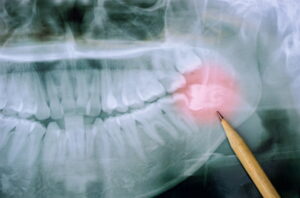Complications Of Problematic Wisdom Teeth
 Most people associate wisdom teeth with pain. And no wonder, these teeth are notorious for being troublemakers, and they can do more damage than just inflict pain.
Most people associate wisdom teeth with pain. And no wonder, these teeth are notorious for being troublemakers, and they can do more damage than just inflict pain.
Considering the fact that the functionality of wisdom teeth is limited or non-existent, especially if they are impacted, the safest way to avoid the risks of impacted wisdom teeth is to have them extracted at the first sign of trouble. The higher the degree of impaction, the worse the patient outcome, so a surgical intervention may need to be performed as urgently as possible.
But the problem is that wisdom teeth can be problematic yet asymptomatic. If there are no symptoms, there are no signs to warn the patient something is wrong. The only solution in this case would be to make regular dental appointments. And even if there are no symptoms and no apparent cause for concern, a wisdom tooth extraction may be the recommended course of treatment because this allows the patient to have better oral hygiene.
But first things first: what are the potential complications of problematic wisdom teeth?
What complications are associated with wisdom teeth?
Many complications frequently associated with wisdom teeth are treatable. If the patient makes an appointment with an oral surgeon in a timely manner, they can be intercepted early on and further damage can effectively be avoided. Possible complications can affect the teeth, gums and jaw, and include:
- Dental misalignment
- Tooth damage
- Tooth decay and cavities
- Infections and abcesses
- Swelling of the gums and jaw
- Trismus (difficulty opening the mouth)
- Halitosis (bad breath)
- Gum disease
- Cysts
- Tumors
- Jaw fracture
What can damage a wisdom tooth?
For many patients, wisdom teeth are damaged to begin with.
Wisdom tooth damage can be caused by:
- Inability to emerge because it is blocked by another tooth (a molar)
- Erupting at an odd angle
- Pre-eruption damage
Normally, wisdom teeth erupt in early adulthood, by the age of 25, but this is not always the case. They can erupt decades later. In a typical scenario, wisdom teeth require removal because they are the last teeth to grow in the jaw, setting the stage for numerous complications, such as impaction or crowding.
Is it common for wisdom teeth to break?
Yes, wisdom teeth can break. This often happens because of the odd, unnatural angle under which wisdom teeth erupt. In fact, wisdom teeth which have failed to erupt properly may be more likely to break than other teeth, partly because they are difficult to access and clean, which in turn increases the risk of decay and associated pathology. A cyst may also develop inside the jawbone.
Cysts are among the most serious complications of impacted wisdom teeth. They are developed around the crown of the tooth, which may lead to additional dental problems in the adjacent teeth and bone tissue.
A broken wisdom tooth can be extremely painful and complications can be severe. It is essential to visit a specialist who can examine you and help you decide on your next step, and, most importantly, help you avoid the nasty side effects of a broken wisdom tooth.
Depending on your symptoms, you can either make a regular or an emergency appointment. In the meantime:
- avoid chewing food on that side to avoid making the situation worse
- clean the broken tooth and the other back teeth gently and carefully.
So while it may be possible to repair and retain broken wisdom teeth, full removal is often recommended in order to avoid further complications, such as jaw fracture. This can happen when a patient has an aggressive cyst in the jawbone that they are unaware of.
Will a dead wisdom tooth fall out?
If a tooth is dead, it has no blood flow in it and it may potentially fall out by itself, much like any loose tooth. But falling out is unlikely to happen with wisdom teeth because of where they are positioned. In the majority of cases, an oral surgeon will need to perform a removal.
Bone fragments may appear at the extraction site following a surgical extraction. This is known as a bone spur and it is nothing to worry about. Namely, these are fragments of the bony socket where the tooth once was. As you heal, your body begins to eject these slivers of bone until they fall out on their own.
Another problem is that losing a tooth, even if it’s a wisdom tooth, may mean that you may suffer other serious consequences, such as advanced-stage gum disease or bone loss. This is the number one reason to visit your dentist on a regular basis.
However, it can be dangerous to wait for this to occur, as the tooth can become infected and affect the jaw and other teeth.
The wisdom teeth removal specialist patients in Menifee and the area trust

At our practice, we can accommodate the needs of patients of all ages. We are on a mission to make your pain go away. During your initial consultation, you will get a personalized treatment and aftercare plan. We will be here to guide you through the recovery process and intercept complications if they arise. Call now!
Comments are closed.

